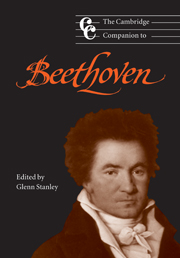Book contents
- Frontmatter
- Part I A professional portrait
- Part II Style and structure
- Part III Genres
- 7 The piano music: concertos, sonatas, variations, small forms
- 8 Beethoven's chamber music with piano: seeking unity in mixed sonorities
- 9 Manner, tone, and tendency in Beethoven's chamber music for strings
- 10 Sound and structure in Beethoven's orchestral music
- 11 Beethoven's songs and vocal style
- 12 Beethoven's essay in opera: historical, text-critical, and interpretative issues in Fidelio
- 13 Probing the sacred genres: Beethoven's religious songs, oratorio, and masses
- Part IV Reception
- Notes
- Selected further reading
- General index
- Index of Beethoven’s compositions and sketches
- Plate section
13 - Probing the sacred genres: Beethoven's religious songs, oratorio, and masses
from Part III - Genres
Published online by Cambridge University Press: 28 September 2011
- Frontmatter
- Part I A professional portrait
- Part II Style and structure
- Part III Genres
- 7 The piano music: concertos, sonatas, variations, small forms
- 8 Beethoven's chamber music with piano: seeking unity in mixed sonorities
- 9 Manner, tone, and tendency in Beethoven's chamber music for strings
- 10 Sound and structure in Beethoven's orchestral music
- 11 Beethoven's songs and vocal style
- 12 Beethoven's essay in opera: historical, text-critical, and interpretative issues in Fidelio
- 13 Probing the sacred genres: Beethoven's religious songs, oratorio, and masses
- Part IV Reception
- Notes
- Selected further reading
- General index
- Index of Beethoven’s compositions and sketches
- Plate section
Summary
Beethoven lived at a time when Christianity and its institutions were losing much of their power, yet the influence of religion is felt not only in his explicitly sacred and liturgical works but also in works such as the Ninth Symphony, Fidelio, and the “Heiliger Dankgesang” from the A minor String Quartet. Since Beethoven, who was baptized as a Catholic, never really subscribed to any one of the many distinct theological currents of his time, it is difficult to obtain a coherent picture of his religious views from the multiplicity of ideas that, as documentary evidence proves, occupied Beethoven's interest. Still, a pattern emerges in his independent pursuit of religious questions that is reflected in his choice of texts to set: for him, religion was something not just dogmatically given and represented through the Catholic Church, but rather to be understood from a human perspective and experienced in its relevance to one's own life – a position that differs as essentially from the Baroque orientation toward the hereafter as from the mysticism and otherworldliness of Romanticism.
The “Gellert” Lieder op. 48 and other songs with sacred texts
With the first unmistakable signs of hearing loss and the deep personal, musical, and ideological crisis that followed, Beethoven began to grapple increasingly with religious ideas. At this time he came to know the Geistliche Oden und Lieder of Christian Fürchtegott Gellert (1st edn., Leipzig, 1757). From these fifty-four texts he chose six with revealing content: “Die Ehre Gottes aus der Natur,” for example, recalls ideas in poems by Christoph Christian Sturm from Betrachtungen über die Werke Gottes im Reiche der Natur . . ., a book which he may have encountered while still in Bonn and later definitely read, and “Vom Tode,”to which the ideas of the last section of the Heiligenstadt Testament (October 1802) closely correspond, seems to reflect his preoccupation with thoughts of death.
- Type
- Chapter
- Information
- The Cambridge Companion to Beethoven , pp. 218 - 236Publisher: Cambridge University PressPrint publication year: 2000
- 1
- Cited by



